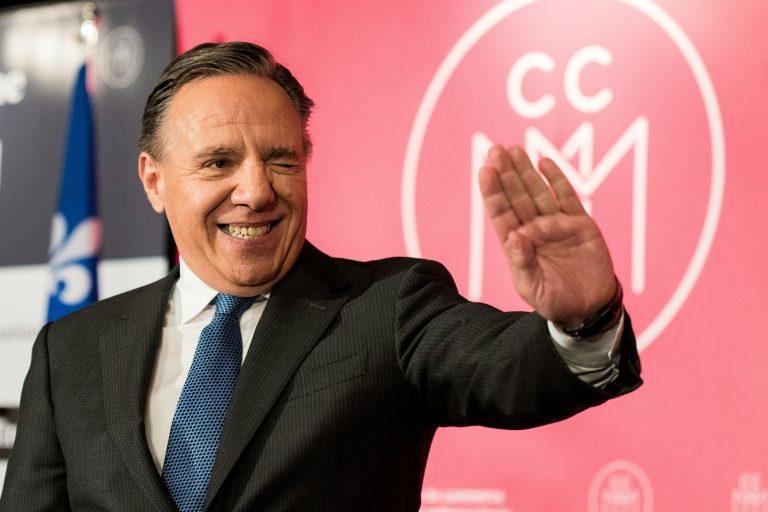CAQ is just what’s left over when you’re fed up with the alternatives
Oct. 2: Coalition Avenir Québec sweeps to power with a majority government in Quebec

This file photo shows François Legault, CAQ leader, during a conference at Plaza-Centreville in Montreal on September 28, 2018. – François Legault party leader of the Coalition Avenir Québec (CAQ) wins Quebec elections on October 1st, 2018. (Photo by MARTIN OUELLET-DIOTTE / AFP) (Photo credit should read MARTIN OUELLET-DIOTTE/AFP/Getty Images)
Share
Welcome to a sneak peek of the Maclean’s Politics Insider newsletter. Sign-up at the bottom of the page to get it delivered straight to your inbox.
At more than 1,000 pages in length, the new USMCA trade deal offers countless hidden corners for pesky detail devils to hide. Shannon Proudfoot and Jason Markusoff sifted through the text of the agreement to determine exactly what Canada, the U.S. and Mexico just agreed to, and who will be the deal’s biggest winners and losers. (Maclean’s)
The battle over the deal now moves to Parliament, where Andrew Scheer’s Conservatives don’t quite seem to know how to confront Justin Trudeau over it, writes Paul Wells. As he notes, it was telling that two-thirds of the way through Question Period on Monday, the Conservatives had already moved on from the trade deal to once again press the government over child killer Terri-Lynne McClintic’s transfer to an Indigenous healing centre. (Maclean’s)
We’ll get back to trade in a moment. But first, Quebec!
After nearly half a century of two-party rule in Quebec, François Legault’s Coalition Avenir Québec swept to power with a strong majority on Monday night. As of 11:30 p.m. the CAQ were elected or leading in 74 of Quebec’s 125 ridings, a massive increase from the 21 seats it held before. Those gains came at the expense of both the Liberals and Parti Quebecois who together have governed the province since 1970. (Canadian Press)
With Philippe Couillard’s Liberals picking up just one-quarter of the popular vote, it was the party’s worst showing since Confederation. Likewise the PQ saw its worst results ever. Even so, Paul Wells doesn’t necessarily regard the CAQ victory as a reflection of overwhelming support for Legault. “His mandate is more negative, residual, than an expression of enthusiasm,” writes Wells. “The CAQ is what’s left over when you’re fed up to here with the other parties.” (Maclean’s)
Returning to NAFTA, er, USMCA. Or how about we just call it CAMUS. Turns out that’s a popular alternative to Trump’s preferred consonantal pile-up, according to our not-exactly unscientific but always entertaining online ranking tool. Check it out and submit your ranking of the best names for the trade deal. (Maclean’s)
Maclean’s Ottawa bureau chief John Geddes pieces together the long, strange journey from Trump’s campaign vow to rip up NAFTA to the late last minute talks that sealed the USMCA deal:
Trump’s insistence that the point of reworking NAFTA was to erase the U.S. trade deficit wasn’t just a matter of misconstruing the treaty’s function for purposes of getting elected—it distorted the whole renegotiation. No trade negotiation—not Canada’s deal with Europe, not the Trans Pacific Partnership—could conceivably have been finalized if the explicit aim was securing one country’s interests at the expense of the others.
. . .
As talks continued into the fall of 2017, formal expressions of hopefulness began to sound strangely detached from informal leaks about what was actually happening at the bargaining table. “I am pleased to report we have found mutual agreement on many important issues,” Lighthizer said after Round 2 in Mexico City in early September. And Freeland chimed in cheerfully, “All three partners are absolutely committed to getting this done.”Yet analysts and experts, industry and union leaders, couldn’t find concrete reasons to be upbeat. Talks seemed stalled on every major issue. (Maclean’s)
Trudeau and Freeland handled the worst America could throw at us, namely Donald Trump, writes Stephen Maher. Now, with a weak leader on Trudeau’s left and a divided right, the Prime Minister’s biggest challenge now is to not get cocky. (Maclean’s)
True to form, Trump is already gloating about all the concessions he extracted from Canada and Mexico, even though all he accomplished was some fiddling at the margins, writes Andrew MacDougall. At the end of the day, though, there are pictures of him signing a document, and to most Trump supporters that’s the smell of napalm in the morning. To them, that’s presidenting. But just because Trump is winning doesn’t mean that Trudeau has lost. (Maclean’s)